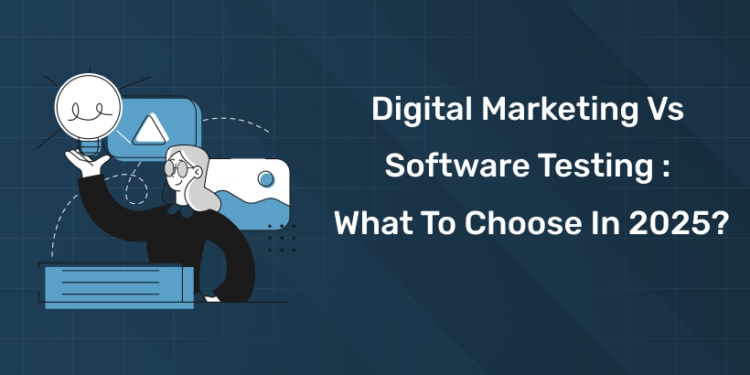Table of Contents
Particularly for those who are confused about Digital Marketing vs Software Testing roles, which are promising and can guarantee opportunities for consistent growth at respectable pay scales, many graduates of this generation prefer a field that can guarantee a secure and happy career and invest a great deal of time in researching and understanding it.
Between the two, choose a career path can occasionally be very difficult and complicated. There are many IT specialists in India, and according to a recent survey conducted by a search engine optimizer, the IT industry has accepted the recession. However, Digital Marketing vs Software Testing may show promise in 2025.
Learn Digital Marketing Fundamentals! Get Free Demo Here!
Introduction
Digital marketers interact with both potential and current customers. Their primary objective is to promote your products and services. Your company’s ultimate goal is to acquire clients or convert revenues. Digital marketers also help you build your brand, communicate with customers, and attract loyal followers. They use a range of online channels, such as blogs, websites, and social media. As a result, many kinds of online marketers have distinct functions.
The estimated value of the global digital marketing market as of 2020 was $350 billion. The prospective increase might show a 13.9% compound annual growth rate (CAGR) and reach $460 billion this year and $786.2 billion by 2026. There is a growing need for digital marketers, whether they work as full-time employees or as independent contractors. According to Bureau of Labor Statistics projections, there may be a 10% need for marketing roles by 2026. This rise is above average when compared to all other careers.
What is digital marketing
Digital marketing is the practice of promoting products and services through digital devices and technology. Digital marketing has erupted into the marketing scene in recent years, and its consequences have not been negligible.The dynamic world of online marketing has presented challenges for conventional marketers and traditional firms, as customers, prospects, and clients have become more skilled in this new environment.
In brief, digital marketing encompasses all forms of online marketing carried out through the use of a computer, smartphone, internet, etc. In addition to digital indicators and maybe non-internet connected devices. It could be as simple as your website’s blog post selections or as complex as automated email marketing campaigns.
Benefits of Digital Marketing
In such a short time, digital marketing has grown a lot in popularity, and for good reason. Customers and consumers of today want their favorite businesses to be online as they spend a growing amount of time on the internet.
Although the internet can be scary, businesses can benefit greatly from efficient digital marketing. The benefits of digital marketing for businesses include reaching target consumers where they are spending their time, growing the audience, and doing all of this for a lot less money than traditional marketing techniques can offer with good planning and execution.
Importance of Digital Marketing
- It reaches a wide range of internet users who make financial and time investments on the internet.
- It places tiny businesses in front of brick and mortar companies with far smaller advertising budgets.
- It gives companies incredibly focused control over making sure their intended audiences read their communications.
- It makes it possible for clients to feel secure and at ease when they subscribe to communications and make purchases through personal-level marketing.
- It permits tracking advertisements and corresponding with the intended audience.
- Growing organizations may get fast results and adjust their optimization accordingly, minimizing lost revenue and wasted ad spend, thanks to its scalability and adaptability.
- When people use the internet to search for goods, services, or anything else they want, it affects their decisions about what to buy.
- It enables companies to advertise to consumers in a way that respects each individual.
Learn Digital Marketing Fundamentals! Get Free Demo Here!
What is software testing
Software testing is a technique used to evaluate a software program’s functionality. The procedure verifies that the software is error-free and determines whether the actual product satisfies the anticipated requirements. Finding mistakes, flaws, or missing requirements in relation to the real requirements is the goal of software testing. Its primary goal is to gauge an application’s or software program’s specifications, functionality, and overall performance.
One crucial step in the software development lifecycle is software testing. It entails confirming and validating that a software program is error-free, complies with technical specifications established during design and development, and effectively and efficiently serves user needs.
Software testing in two steps
- Verification is the process of ensuring that a particular function is implemented correctly by the program through a series of tasks.”Are we building the product right?” is what it means.
- Validation: This term describes an alternative set of procedures used to guarantee that the developed software can be linked back to the needs of the client.”Are we building the right product?” is what it means.
Types of Software Testing:
1. Manual testing:
It involves manually testing software, that is, without the use of any scripts or automated tools. In this kind, the tester tests the software by assuming the role of an end user and looking for any unexpected behavior or bugs. Unit testing, integration testing, system testing, and user acceptability testing are some of the phases that fall within the manual testing process.To guarantee that every software has been tested thoroughly, testers utilize test plans, test cases, or test scenarios. Exploratory testing is a part of manual testing as well; testers examine the software to find bugs.
2. Automation testing:
Another name for it is test automation, which is the process of a tester writing scripts and using another piece of software to test a product. A manual process is being automated in this process. The purpose of automation testing is to swiftly and frequently rerun the test scenarios that were carried out by hand during manual testing.
3. Functional testing:
This kind of software testing verifies the software systems’ compliance with the functional specifications. This is done to see if the application is operating in accordance with the functional requirements of the program. Unit testing, integration testing, system testing, smoke testing, and other forms of functional testing are among them.
4. Non-functional testing:
In this software testing examines the program for non-functional needs such as stress, performance, scalability, and portability. Performance testing, stress testing, usability testing, and other testing methods are examples of non-functional testing.
5. Maintenance testing:
It is the process of upgrading, altering, and changing the software to meet the needs of the user. Regression testing is used to confirm that recent code modifications haven’t had a negative impact on any of the software’s previously functional components.
Key differences between digital marketing & software testing
1. Skill Sets: Digital Marketing Vs Software Testing
It’s possible that the skill sets required for them both differ. In order to succeed in digital marketing, one must be creative, aware of their surroundings, keep up with emerging trends, and determine the path that their target audience is taking. Clients differ according to their geographic locations as well. Therefore, conducting a demographic analysis is also essential.
A profession in digital marketing requires a love of digital media, networking, research inclination, and communication abilities. In order to succeed as a digital marketer, one need just possess a fundamental understanding of computers. However, software testing calls for a strong grasp of analytical and mathematical concepts, as well as proficiency with automation languages and tools like load runners and WinRunner. These languages and tools include shell, Perl, Python, and TCL, and occasionally JavaScript.
2. Salaries & Roles: Digital Marketing Vs Software Testing
Salary ranges are also different. The pay scale and raises in the software sector are well-known. Although it is still in its infancy, digital marketing is expected to grow in the coming years. As predicted several years ago, salaries in this field can vary greatly and are significantly higher than those in software testing. Professionals with the right skills can command very high compensation because there aren’t many of them.
In both cases, entry-level payscales are modest. The pay increases with expertise in both fields, and because businesses are always seeking for qualified marketers, digital marketing has seen very strong increases. The assignments and promotions are pretty much the same. Test engineers, senior test engineers, test leads, test managers, and technical architects are the first levels in software testing. A digital marketing analyst, specialist, team manager, team lead, strategist, and chief marketing officer are among the roles in the field.
3. Work-Life Balance: Digital Marketing Vs Software Testing
In terms of work-life balance, the software testing sector is infamous for its lengthy workdays, monotony, and lack of equilibrium. A successful digital marketer has many more alternatives for flexibility in their career, including work-from-home opportunities and vocational variations, making their life easier than that of a software tester.
The variety of professional opportunities available to digital marketers makes their lives intriguing. It provides greater job satisfaction than anything else.
4. Growth: Digital Marketing vs Software Testing
Software testing is distinct since it is a wide phrase that encompasses several tiers of sub-testing elements. A product must pass several testing stages before it is released onto the market. There are several classifications for testing. Functional testing and non-functional testing are two categories. Unit testing, integration testing, system testing, sanity testing, smoke testing, interface testing, regression testing, and user acceptability testing are among the several testing techniques.
Tests that are not functional include performance, reliability, soak testing, and so on. Localization and internationalization are other strategies used in software testing. They certify that the software is usable in multiple languages and across diverse demographic contexts.
Software testing is unique in that it is a broad term that includes various levels of sub-testing components. Before a product is put on the market, it must pass multiple testing phases. There are various testing classifications. There are two types of testing: non-functional testing and functional testing. Among the many testing methods are unit testing, integration testing, system testing, sanity testing, smoke testing, interface testing, regression testing, and user acceptance testing.
Entri App- Best Online Digital Marketing Course
1: What is the primary goal of SEO (Search Engine Optimization)?
Entri Elevate Digital Marketing Course with Placement offer valuable knowledge and skills for success in the digital era. The course is intended for individuals new to digital marketing and interested in pursuing careers in performance marketing. You will learn various tools and techniques to attract and engage customers, explore different digital marketing channels, and create effective campaigns. Further, these courses are affordable and flexible and equip you with the skills needed to succeed in digital marketing roles.
Career possibilities after completing a digital marketing course:
- Digital Marketing Analyst
- Performance marketer
- Social Media Strategist
- Content Strategist
- Marketing Consultant
- SEO Specialist
- PPC Specialist
- Web Analyst
- Affiliate Marketing Specialist
- Digital Analyst
| Explore These High Demand Marketing Course | |
| Digital marketing Training | Performance marketing Course |
Frequently Asked Questions
Digital marketing or software testing: which is best?
Compared to software testers, successful digital marketers have it easier in life and have access to many more flexible options, such as work from home opportunities and career variations. Because there are so many different career alternatives available to digital marketers, their lives are interesting.
Is there a future for software testing?
In 2025, will digital marketing still worthwhile?
India’s digital marketing sector is expanding quickly, and there is a rising need for both new businesses and well-known names. According to Goldman Sachs research, the Indian digital marketing sector is projected to create over 9 lakh employment by 2024 and reach a valuation of US$160 billion by 2025.











